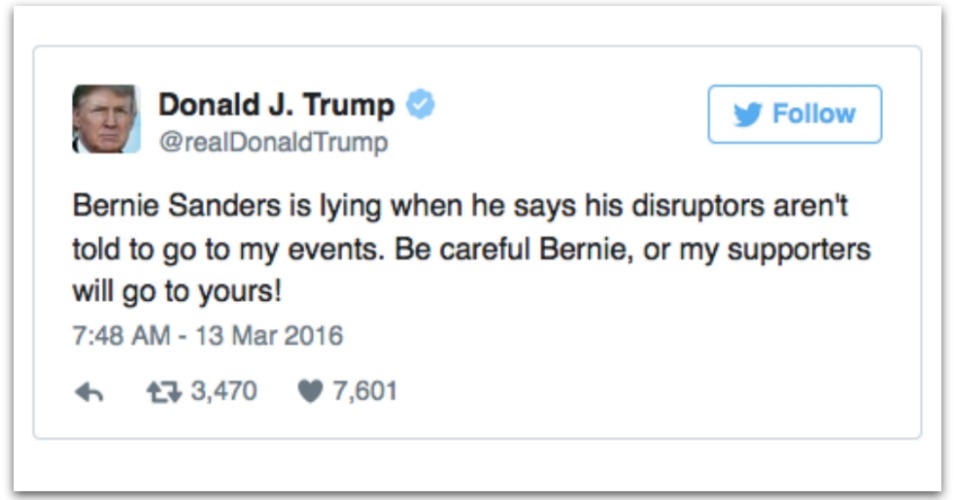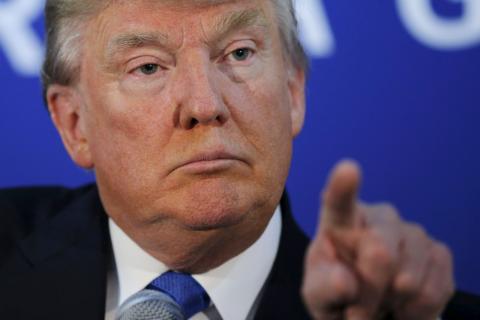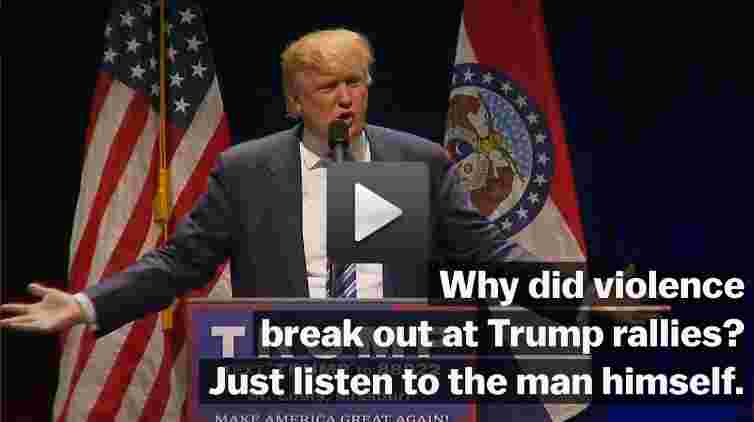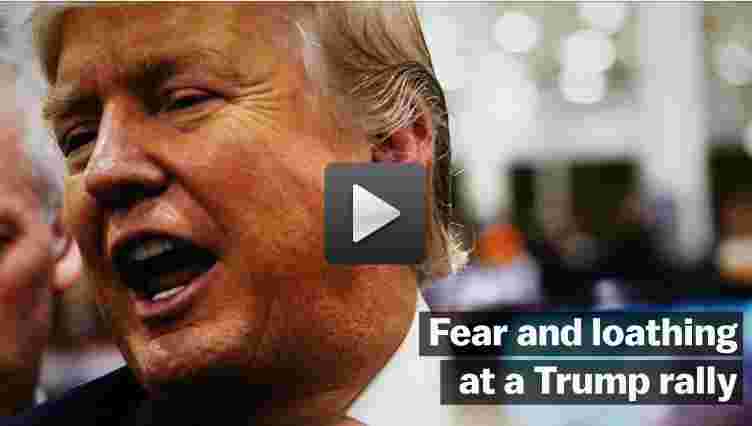'It's Not a Threat!': Trump Says He'll Order Supporters to Disrupt Sanders' Rallies
Common Dreams
Jon Queally
March 13, 2016

Donald Trump on Sunday morning went after potential general election rival Bernie Sanders by calling him a liar and indicated he might soon instruct his own supporters to attend Sanders' rallies in order to foment disruption and discord among his progressive (aka "super-liberal") base.
In a tweet, Trump declared: 'Bernie Sanders is lying when he says his disruptors aren't told to go to my events. Be careful Bernie, or my supporters will go to yours!'
The social media salvo followed a chaotic cancellation of Trump rally in Chicago that turned violent on Friday and images of protesters being pepper-sprayed by police outside a rally in Kansas City on Saturday night. With waves of criticisms against Trump reverberating over the weekend for the role he's played in ginning up tensions, any expectations or hopes that the Republican presidential candidate would make efforts to tamp down the palpable tensions were dashed rather immediately.
"My people have said we oughtta go to his rallies, when liberals and super-liberals, I don’t even call ‘em liberals... These people are bad people that are looking to do harm to our country." —Donald Trump
In fact, the near opposite happened as Trump refused to accept any responsibility for the acrimony, defending the behavior of his supporters, and projecting blame on others by accusing the Sanders of "organizing" the protests.
At a rally in Cleveland on Saturday, Trump charged that Friday's protests in Chicago were directed by the Sanders' campaign, an assertion the Sanders' camp immediately denied and which no evidence exists to support.
"As is the case virtually every day, Donald Trump is showing the American people that he is a pathological liar," Sanders said in a statement on Saturday. Though it was clear that many protesters in Chicago were, in fact, vocal Sanders' supporters, far more appeared only unified by their opposition to Trump's political message and campaign rhetoric.
"I don't think our supporters are inciting. What our supporters are doing is responding to a candidate who has, in fact, in many ways, encouraged violence," Sanders said during a Saturday press conference in Chicago."When he talks about: 'I wish we were in the old days when you could punch somebody in the head.' What do you think that says to his supporters?"
Appearing on CNN's State of the Union with Jake Tapper on Sunday morning, Trump said that he is quite serious about issuing orders so that his supporters would go and confront people at Sanders' rallies.
"When talks about: 'I wish we were in the old days when you could punch somebody in the head.' What do you think that says to his supporters?" —Bernie Sanders
"It’s not a threat, it’s not a threat. It’s not a threat at all!" Trump declared when asked by Tapper about the tweeted message. "My people have said we ought to go to his rallies, when liberals and super-liberals, I don’t even call ‘em liberals... These people are bad people that are looking to do harm to our country. These people come into mine … They’re being arrested and all sorts of things are happening to them. There’s a horrible thing going on in the media. We are treated so unfairly, and I’m treated so unfairly."
Here's the segment with Trump followed by Sanders speaking on CNN.
Separately on Saturday, Trump said he is now considering pressing charges against those who would protest or disrupt his events in the future. "I hope they arrest these people, because honestly they should be," Trump told supporters referring to a new wave of protesters at the rally in Kansas City on Saturday night. "The only way to stop the craziness is to press charges."
____________________
Donald Trump's Ideology of Violence
Vox
Ezra Klein
March 12, 2016
During a rally in St. Louis Friday, Donald Trump lamented that "nobody wants to hurt each other anymore."
Yes, lamented.
The topic was protesters, and Trump's frustration was clear. "They're being politically correct the way they take them out," he sighed. "Protesters, they realize there are no consequences to protesting anymore. There used to be consequences. There are none anymore."
"Our country has to toughen up folks. We have to toughen up. These people are bringing us down. They are bringing us down. These people are so bad for our country, you have no idea."
This is more than an aside; this is the core of Trump's ideology. The protesters who interrupted his rally, the political correctness that kept the police from cracking their skulls, the press that takes the hippies' side — this is why America has stopped being great. We were strong, and we were tough, and we didn't take this kind of shit from anybody. And now we are weak, and we are scared, and we take this kind of shit from everybody.
How is a country that can't shut down a protester going to out-negotiate the Chinese? How is a country that that is so afraid of hurt feelings going to crush ISIS?
"We better toughen up, we better smarten up, and we better stop with this political correctness because it’s driving us down the tubes," Trump said.
Hours after that speech, 32 people were arrested and several were injured as Trump's supporters clashed with anti-Trump protesters and police. That night, Trump had to cancel a rally in Chicago for safety reasons.
Violence is scary. But violence-as-ideology is terrifying. And that's where Trump's campaign has gone.
"Knock the hell out of them. I promise you I will pay for the legal fees. I promise."
On February 1st, Trump made a promise to an angry crowd. You protect me, he said, and I'll protect you. "If you see someone getting ready to throw a tomato, knock the crap out of them, would you? Seriously. Knock the hell out of them. I promise you I will pay for the legal fees. I promise."
No one threw a tomato at that rally. But a few weeks later, Donald Trump showed that he meant what he said — if you used force to protect him, he'd have your back.
Trump was leaving a rally when Michelle Fields, a reporter for the Trump-friendly Breitbart News, stepped forward to ask a question. Corey Lewandowski, Donald Trump's campaign manager, grabbed her by the arm and threw her out of the way. His grip was hard enough to leave bruises on her arm. The moment was witnessed by Ben Terris, a Washington Post reporter, and there's audio and video record of it.
There were simple ways Trump's campaign could have responded to this. Lewandowski could have apologized. He could have said Fields startled him, and he was protecting his candidate.
But this is the press we're talking about. "The most dishonest human beings on earth." No fucking way Trump was going to back down to them.
"The accusation which has only been made in the media and never addressed directly with the campaign is entirely false," Trump's spokeswoman, Hope Hicks, said in a statement.
"Michelle Fields is an attention seeker," tweeted Lewandowski.
"This was, in my opinion, made up," Trump himself said. "Everybody said nothing happened. Perhaps she made the story up. I think that's what happened."
Donald Trump will pay your legal fees. He will believe your baldfaced lie. He is on your side against the protesters, the press, the losers who are bring America down. He knows things get rough sometimes. He's got your back.
"People who are following me are very passionate"
"The incidents are piling up," wrote Lucia Graves at the Guardian. "A Black Lives Matters protester was sucker-punched by a white bystander at a rally in Fayetteville, North Carolina. A young black woman was surrounded and shoved aggressively by a number of individuals at a rally in Louisville, Kentucky. A black protester was tackled, then punched and kicked by a group of men as he curled up on the ground in Birmingham, Alabama. Immigration activists were shoved and stripped of their signs by a crowd in Richmond, Virginia. A Latino protester was knocked down and kicked by a Trump supporter in Miami."
I would add another "incident" to Graves' list. Back in August, two young Trump supporters, Scott and Steve Leader, were charged in the beating of a homeless Mexican man. They found him sleeping outside a subway station and began hitting him with a metal pole.
According to police, Scott Leader justified the assault by telling them, "Donald Trump was right — all these illegals need to be deported."
Asked to react to the beating, Trump said he had no knowledge of it, which would have been fine. But he didn't stop there. "I will say that people who are following me are very passionate," Trump replied. "They love this country and they want this country to be great again."
"These are the people that are destroying our country"
The great mistake the media makes with Donald Trump is to pretend he has no ideology — that he's just a celebrity, a carnival barker, a reality star.
As my colleague Matt Yglesias has written, Trump does have an ideology. He does have an agenda. The core of Trumpism is "a revived and unapologetic American nationalism, which will stand for American interests abroad while defending the traditional conception of the American nation at home."
Like most nationalists, the emotional center of Trump's ideology is an Us vs. Them argument. "These are not the people who made our country great," Trump told the crowd in St. Louis. "We're going to make it great again, but these are not the people. These are the people that are destroying our country."
The Us must somehow defeat the Them — and the stakes are high, the future of the greatest country the world has ever known depends on the outcome. This is why nationalistic, Us vs. Them appeals lend themselves so easily and naturally to violence.
This is what Trump supporters hear at his rallies. They are told that America is no longer great. They are told who to blame. They are told that the reason these losers are dragging America down is we have become too politically correct, too scared, too weak, to stop them. They are told Trump will pay their legal fees if they want to do what's necessary. "There used to be consequences," Trump sighs. The crowd knows what he's asking. Make Consequences Real Again.
This is ugly, but it is coherent. What Trump is offering is an explanation and a solution; an argument and an ideology. It is dangerous, and it is violent, but it is not confusing, and it is not unclear.
And this is why Trump is something different and more dangerous in American life. He is a man with an evident appetite for suppressing dissent with violence, a man who believes America's problem is that it's too gentle to its dissidents. Trump is making an argument for a politics backed by force, for a security service unleashed from "political correctness," for a country where protesting has consequences. The results are playing out before us, night after night, on our televisions.
If Trump wins and this country goes down a dark path, we will never be able to say we didn't see it coming. We will never be able to say we weren't warned.
Ezra Klein is Editor-in-Chief of Vox




Spread the word